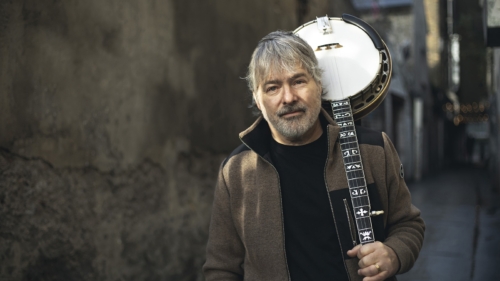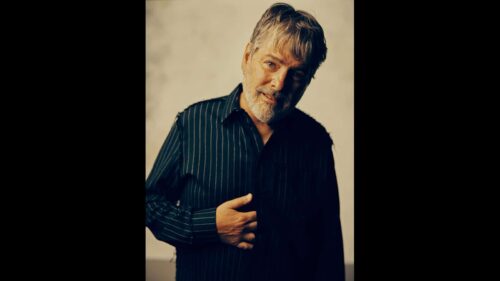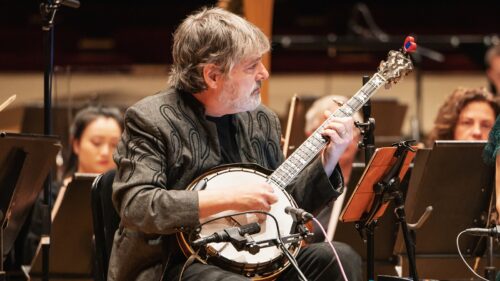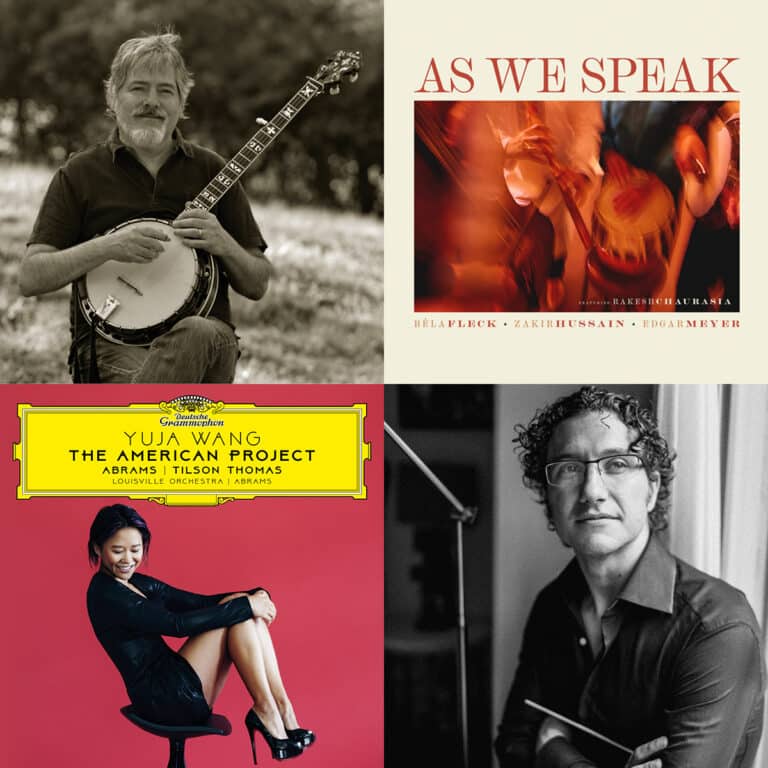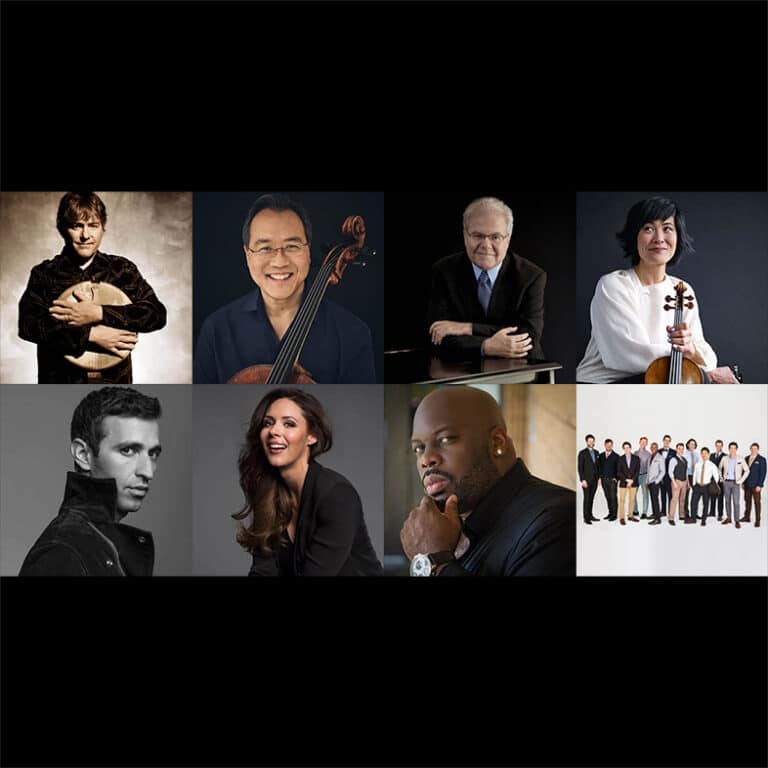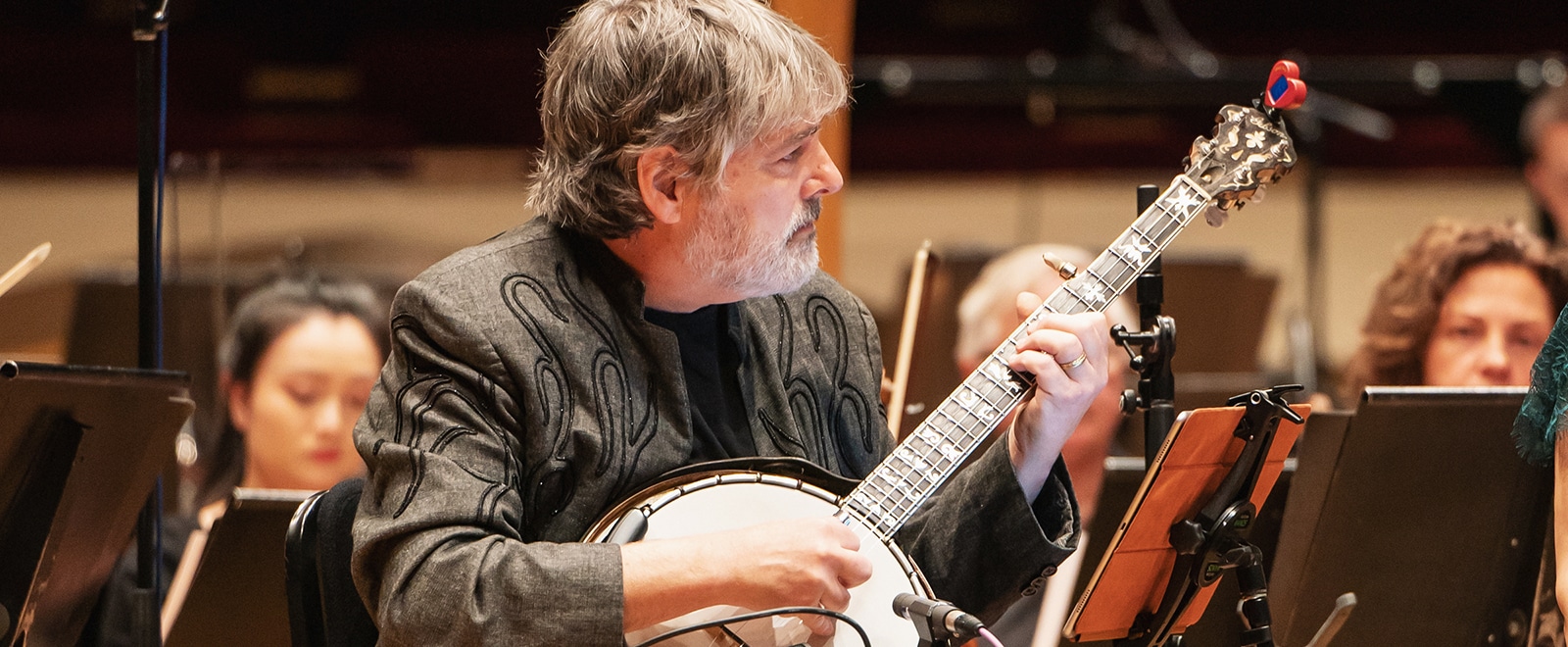
The New York Times“Mr. Fleck can lay claim to the title of the most popular living banjoist, having done much to push the instrument beyond the bluegrass terra firma into jazz, classical and beyond.”
All Music Guide“Virtuoso Béla Fleck has broken more boundaries than any other banjoist.”
Cincinnati Business Journal“Transcribing the jazzy work from piano to banjo presented a formidable challenge. Great fistfuls of piano figures that can be tossed off on a piano are difficult to recreate on five strings. But Fleck’s feats of banjo picking often astonished in the way he was able to capture most of the piano notes, sometimes jumping up or down an octave, other times leaving out a few notes…Fleck brought artistry and considerable virtuosity to every passage.”
Cleveland.com“Béla Fleck surprised the Blossom Music Center crowd not so much by the level of his playing — virtuosic as always — but by how well he adapted the solo piano part for the banjo in his transcription of George Gershwin’s Rhapsody in Blue.”
Alto Riot“Fleck’s concerto for banjo and symphony orchestra off The Impostor edges out the competition for its determined attitude and ambitious undertaking in areas the banjo has never gone before. The world’s most popular banjoist essentially reinvents the rulebook in music written for banjo in an exceptionally grandeur vision. Writing for his first concerto, Fleck is crisp in merging trademark twangs with seeping, mysterious strings. The frontier/americana lineage of the banjo is highlighted in this surprisingly risky romp, protruding an adventurous sprit. Together with the Nashville Symphony Orchestra, Béla Fleck’s performance is fluid with just the proper amount of danger. But what really drives the heart of Fleck’s concerto for banjo is its pure honesty and genuine penchant for melody. While many concerto recordings in 2013 will ride on the strength of their performance quality none posses as much memorability and character as Fleck’s concerto for banjo.”
Art Wach“While not a narrative work as such, Juno could nonetheless be regarded as a sequel if only because it is so successful in giving elevated credence to the banjo as a legitimate, indeed beautiful denizen of the Classical world…Along with revealing Fleck’s heightened appreciation of the emotive colors that a full orchestra can provide, Juno also shows a studied commitment to the traditional concerto format of three movements in fast-slow-fast order. Within that structure, Fleck’s thematic developments feel less frenetic than in The Impostor, though no less an adventurous platform for his astonishing virtuosity as a soloist. This time the music, for all of its harmonic eclecticism and contrapuntal complexity, exudes newfound elegance and confidence.”
The Barre Montpelier Times Argus“Rutland’s Paramount Theatre was packed Saturday evening, likely to hear the great banjoist Béla Fleck perform his own version of George Gershwin’s beloved “Rhapsody in Blue” with the Vermont Symphony Orchestra. (Attendance at Friday’s performance of the same program at The Flynn in Burlington had the VSO’s largest attendance since cellist Yo Yo Ma was the soloist.)…“Rhapsody in Blue” is a delightful one-movement jazz-based piano concerto. And, although the powerful piano’s place in the piece will never be usurped, Fleck made a pretty good case for the banjo (amplified, of course). His performance was effective in part due to his amazing virtuosity, but also to his rhapsodic take on the work.”
Chattanooga Times Free Press“From the outset, Fleck treats the banjo more like a musical instrument than simply a bluegrass instrument. He puts it through its paces and demonstrates its potential far beyond its ‘Beverley Hillbillies’ persona. There are certainly a few captivating moments and flashes of virtuosic playing, but the focus seems to be on the intrinsic quality of the music itself (sounding at times like Bartok, Prokofiev, or Gershwin) rather than on the novelty of a bluegrass instrument paired with an orchestra.”
Just in case you aren’t familiar with Béla Fleck, there are many who say he’s the premiere banjo player in the world. Others claim that Fleck has virtually reinvented the image and the sound of the banjo through a remarkable performing and recording career that has taken him all over the musical map and on a range of solo projects and collaborations. If you are familiar with Fleck, you know that he just loves to play the banjo, and put it into unique settings.
A nineteen-time Grammy Award-winner, Fleck has the virtuosic, jazz-to-classical ingenuity of an iconic instrumentalist and composer with bluegrass roots. For over 30 years, he has led Béla Fleck and The Flecktones, the groundbreaking quartet inspired by jazz, funk, bluegrass and beyond. From writing three banjo concertos for full symphony orchestra to exploring the banjo’s African roots with the award-winning 2009 documentary Throw Down Your Heart, many tout that Béla Fleck is the world’s premier banjo player. As Jon Pareles wrote for The New York Times, “That’s a lot of territory for five strings.”
Collaborators include Abigail Washburn, the Brooklyn Rider String Quartet, Chris Thile, The Blind Boys of Alabama, McCoy Tyner, Zakir Hussain, Edgar Meyer, and Rakesh Chaurasia (their latest album As We Speak won two Grammys in 2024). Fleck’s album Rhapsody in Blue was released February 12, 2024 on the centennial of the work’s premiere in New York City, and he debuted it at Carnegie Hall with an orchestra in May. His Grammy-winning project My Bluegrass Heart, is named in honor of his friend and hero Chick Corea (My Spanish Heart). Béla and Chick have toured as a duo and released three acclaimed albums, including their latest and final duo project, Remembrance (2024), which earned a GRAMMY for Best Jazz Instrumental Album.
2024-2025
